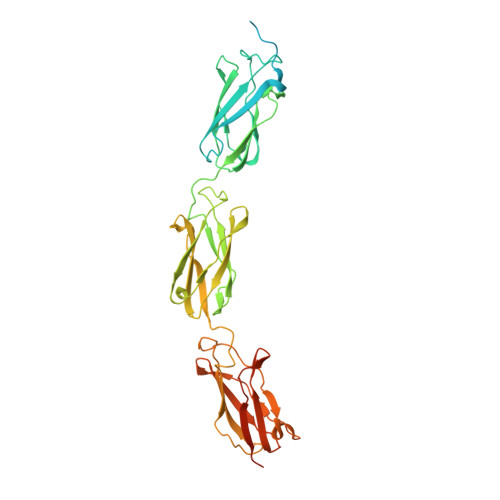FdeC, a novel broadly conserved Escherichia coli adhesin eliciting protection against urinary tract infections.
Nesta, B., Spraggon, G., Alteri, C., Moriel, D.G., Rosini, R., Veggi, D., Smith, S., Bertoldi, I., Pastorello, I., Ferlenghi, I., Fontana, M.R., Frankel, G., Mobley, H.L., Rappuoli, R., Pizza, M., Serino, L., Soriani, M.(2012) mBio 3
- PubMed: 22496310
- DOI: https://doi.org/10.1128/mBio.00010-12
- Primary Citation of Related Structures:
4E9L - PubMed Abstract:
The increasing antibiotic resistance of pathogenic Escherichia coli species and the absence of a pan-protective vaccine pose major health concerns. We recently identified, by subtractive reverse vaccinology, nine Escherichia coli antigens that protect mice from sepsis. In this study, we characterized one of them, ECOK1_0290, named FdeC (factor adherence E. coli) for its ability to mediate E. coli adhesion to mammalian cells and extracellular matrix. This adhesive propensity was consistent with the X-ray structure of one of the FdeC domains that shows a striking structural homology to Yersinia pseudotuberculosis invasin and enteropathogenic E. coli intimin. Confocal imaging analysis revealed that expression of FdeC on the bacterial surface is triggered by interaction of E. coli with host cells. This phenotype was also observed in bladder tissue sections derived from mice infected with an extraintestinal strain. Indeed, we observed that FdeC contributes to colonization of the bladder and kidney, with the wild-type strain outcompeting the fdeC mutant in cochallenge experiments. Finally, intranasal mucosal immunization with recombinant FdeC significantly reduced kidney colonization in mice challenged transurethrally with uropathogenic E. coli, supporting a role for FdeC in urinary tract infections. Pathogenic Escherichia coli strains are involved in a diverse spectrum of diseases, including intestinal and extraintestinal infections (urinary tract infections and sepsis). The absence of a broadly protective vaccine against all these E. coli strains is a major problem for modern society due to high costs to health care systems. Here, we describe the structural and functional properties of a recently reported protective antigen, named FdeC, and elucidated its putative role during extraintestinal pathogenic E. coli infection by using both in vitro and in vivo infection models. The conservation of FdeC among strains of different E. coli pathotypes highlights its potential as a component of a broadly protective vaccine against extraintestinal and intestinal E. coli infections.
- Novartis Vaccines and Diagnostics Srl, Siena, Italy.
Organizational Affiliation:
















